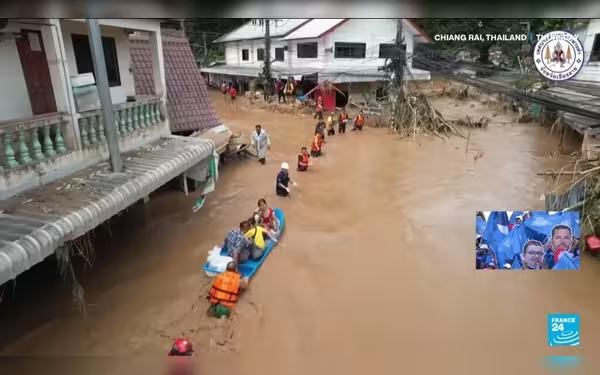Saturday, November 16, 2024 05:27 PM
Southeast Asia Faces Catastrophic Floods and Landslides After Typhoon Yagi
- Typhoon Yagi causes severe flooding in Southeast Asia.
- Hundreds displaced in Myanmar due to landslides.
- Rescue operations hindered by ongoing heavy rains.
 Image Credits: france24
Image Credits: france24Typhoon Yagi wreaks havoc in Southeast Asia, causing floods and landslides, displacing hundreds in Myanmar and complicating rescue efforts.
In recent days, Southeast Asia has faced devastating natural disasters, primarily due to the impact of Typhoon Yagi. This powerful storm unleashed a torrential downpour across several countries, leading to severe flooding and landslides. The situation has been particularly dire in Myanmar, where hundreds of villagers have been forced to flee their homes, navigating through waters that reached up to their chins. The capital city, Naypyidaw, has been significantly affected, with many residents struggling to find safety amidst the chaos.
As the storm made its way through the region last weekend, it left a trail of destruction in its wake. Vietnam, Laos, Thailand, and Myanmar have all been grappling with the aftermath of Typhoon Yagi. In Vietnam, efforts are now underway to clear the debris and restore normalcy after the storm's fury. The heavy rains not only caused flooding but also triggered landslides, which have further complicated rescue and recovery operations.
The impact of Typhoon Yagi serves as a stark reminder of the increasing frequency and intensity of natural disasters in our world today. Climate change is a significant factor contributing to these extreme weather events, and it is crucial for communities to prepare and adapt to such challenges. Governments and organizations must work together to implement effective disaster management strategies to protect vulnerable populations.
As we reflect on the devastation caused by Typhoon Yagi, it is essential to remember the resilience of the affected communities. While the road to recovery may be long and arduous, the spirit of solidarity and support among neighbors can help rebuild lives and restore hope. It is a time for compassion and action, as we stand in solidarity with those who have been impacted by this disaster.













